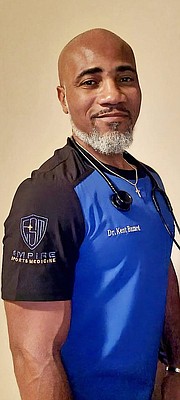SPORTS are a thrilling and challenging pursuit, pushing athletes to their limits and inspiring greatness. Behind the scenes, a group of specialised medical professionals works tirelessly to ensure the well-being of athletes and help them prevent and manage injuries.
At the core of this team is the sports medicine physician. Sports medicine physicians play a vital role in the world of athletics, focusing on the prevention, diagnosis, treatment and rehabilitation of sports-related injuries.
Their extensive knowledge, combined with a deep understanding of the unique demands of sports activities, positions them at the forefront of athlete care and performance optimisation.
Prevention is the cornerstone of sports medicine, and sports medicine physicians employ a comprehensive approach to minimise the risk of injuries.
They assess athletes’ overall health and physical condition, conduct pre-participation evaluations, and provide guidance on proper warm-up routines, conditioning exercises, and injury prevention techniques.
By identifying potential risk factors and implementing targeted prevention strategies, they empower athletes to perform at their best while reducing the likelihood of injuries.
When injuries occur, sports medicine physicians are the go-to experts for accurate diagnosis and effective treatment plans.
Armed with a deep understanding of musculoskeletal injuries, they employ advanced imaging techniques, such as X-rays, MRI scans and ultrasounds, to precisely identify the nature and extent of the injury. Drawing upon their expertise, they develop personalised treatment plans that may include a combination of physical therapy, medication, injections and orthopedic interventions.
Rehabilitation is a crucial phase in the journey towards recovery, and sports medicine physicians oversee and guide the rehabilitation process.
They collaborate closely with physical therapists, athletic trainers and other healthcare professionals to design tailored exercise programmes, monitor progress and ensure a safe return to activity. Through targeted rehabilitation, they aim to restore function, optimise healing and reduce the risk of re-injury, enabling athletes to resume their sport with confidence.
Furthermore, sports medicine physicians are at the forefront of cutting-edge research, continuously expanding their knowledge and contributing to the advancement of sports medicine.
Their commitment to staying abreast of the latest scientific findings and best practices enables them to deliver evidence-based care and offer innovative treatment options to athletes.
In a world where athletes constantly push the boundaries of what is possible, the role of sports medicine physicians is indispensable.
They are the guiding force behind the scenes, working tirelessly to support athletes, prevent injuries and facilitate optimal performance.
Their expertise extends beyond treating injuries; they serve as advocates for athlete health, educators on injury prevention, and catalysts for lifelong wellness.
So, the next time you witness the awe-inspiring feats of an athlete, remember the dedicated Sports Medicine Physicians working diligently behind the scenes. They play a pivotal role in ensuring that athletes can pursue their passions safely, minimize injuries, and reach their full potential on the field, court, or track.
In a world where the pursuit of greatness never stops, Sports Medicine Physicians are the guardians of athlete well-being, making a difference in the lives of athletes, one game-changing injury prevention and management plan at a time.
• Dr. Kent Bazard, is a Bahamian Sports Medicine Physician, Sports Performance Coach Sports Nutrition Specialist, and Founder of Empire Sports Medicine. Our mission is to empower athletes to reach new heights while safeguarding their health and well-being. We understand the unique demands of sports activities, and we are dedicated to helping athletes prevent injuries, overcome challenges, optimize nutrition and performance.





Comments
Use the comment form below to begin a discussion about this content.
Sign in to comment
OpenID